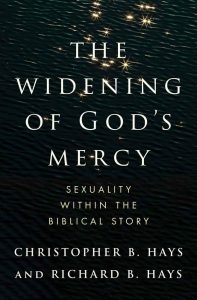“There’s a wideness in God’s mercy,” says the old hymn by Frederick William Faber, “like the wideness of the sea.” Millions of Christians have sung this song in their churches since it was written in 1862, basking in the magnitude of God’s grace offered to them through the work of Jesus.
Yet for the vast majority of the faithful who have sung those words, there also have been strict limitations on just how wide God’s mercy actually was. Throughout history, the church has been nearly unanimous in erecting boundaries to keep out those they believed could not be included in God’s wide mercy — be it slaves, women, the divorced or those who didn’t require women to cover their heads in worship. In different eras of Christian history, strong and clear boundaries related to these issues were justified by a very “plain reading of Scripture.”

Brandan Robertson
But then, the church changed.
In every moment of ethical or theological transformation, Christians have grappled with the larger question of whether such change was due to our own misunderstanding of the faith — so that we are returning to what has always been true — or if God has changed, calling us to a new ethical or theological paradigm. Many Christians have held tightly to the doctrine of divine immutability — the idea that God does not and cannot change — forcing them to argue that any transformation in beliefs and practices is a matter of human misinterpretation rather than divine evolution.
“We are drawn by God’s Spirit slowly but surely toward a fuller revelation of God’s truth.”
Yet, within Scripture itself, it seems clear that God does sometimes change his mind. There are numerous instances of God repenting of commands he gave or actions he took. Moreover, when one looks at how both ethics and theology evolve in Scripture, it becomes evident there is an expectation that the Spirit of God reveals truth to humanity progressively — meaning that we are drawn by God’s Spirit slowly but surely toward a fuller revelation of God’s truth. This suggests that sometimes what was revealed previously was not the fulness of truth, but rather a step toward a greater truth and a higher ethical standard.
This is the theology of the Bible
This theology is not new — this, I would argue, is the theology of the Bible itself. Versions of this theology of progressive revelation have existed in both Judaism and Christianity since the beginning. However, in our modern era, Christian fundamentalism (which has now evolved into mainstream evangelicalism) has fought hard to convince the faithful that such theology is unorthodox and that they must cling to a rigid, “unchanging” theological and ethical paradigm that has “always been.”
Of course, no such theology or ethic exists. All theology and ethics are always contextual; they always evolve and always change. Any historian will tell you the theology and ethics of every branch of modern Christianity are different from the theology and ethics that Jesus and the apostles held to because knowledge evolves, perspectives and contexts change, and that results in an evolving faith.
Yet many modern evangelicals resist this truth, arguing they are clinging to the unchanging faith and morals of Scripture.
Clobber no more
This struggle between the evolving nature of faith and morals and the resistance of evangelicals to acknowledge the need for such evolution is seen no more clearly than on the issue of homosexuality.
Much time has been spent over the past 50 years debating the six so-called “clobber passages,” which evangelicals claim clearly condemn all same-sex sexual relations. In contrast, most other scholars acknowledge these passages refer to distinctly different realities that existed in the ancient world and not to loving, consensual same-sex relationships.
The tug of war is over whether we should embrace what is seen as a “new” moral paradigm that views all consensual adult relationships as morally neutral or if we should cling to “what the Bible says” and reject same-sex relationships as an affront to God, even if no clear moral harm can be demonstrated from such relationships.
At the heart of this debate is not actually a disagreement about six verses of Scripture, but rather a disagreement about the very nature of God and our faith.
“At the heart of this debate is … a disagreement about the very nature of God and our faith.”
One side views the Bible as the unchanging, inerrant, final word on all matters of faith and ethics, and God as static, unchanging and demanding obedience to these ancient laws and standards. The salvation of the faithful remnant who remains true to the faith is thus assured.
The other side broadly understands Scripture as a selection of sacred writings inspired by God but reflecting both an ongoing evolution in how humans understood and related to God and how God has chosen to reveal himself to humanity. Whether or not God fundamentally changes is a topic of debate even among progressives, but most agree that, at the very least, God reveals truth to humanity progressively over time, as seen in the Bible. They believe God’s fundamental vision is toward the inclusion and redemption of all people. Therefore, the issue isn’t really about homosexuality at all — it’s much more expansive than that.
Many scholars have sought to highlight this disagreement over the years, especially queer theologians, who have demonstrated that debates about clobber passages are ultimately fruitless and that a queering of the way we understand our faith is what is required for both straight and LGBTQ people alike. I have made this argument in my books Our Witness and The Gospel of Inclusion, and in my forthcoming book Queer and Christian, drawing on the rich legacy of queer and progressive biblical scholars who have long critiqued evangelical Christianity for the ways it seeks to constrain God and Christians with rigid rules and doctrines.
Yet these arguments rarely have broken through to evangelical Christians, and the conversation about homosexuality continues to center on the exegesis of the six clobber passages rather than on dissecting the fundamental differences in how most Christians throughout history have understood God and the Bible, compared to the way fundamentalists and evangelicals do.
Why this book matters
 This is why Richard and Christopher Hays’ new book, The Widening of God’s Mercy: Sexuality within the Biblical Story, is so important. Richard B. Hays is one of the most respected biblical scholars in the world today, and his book The Moral Vision of the New Testament is seen as one of the foundational texts that evangelicals have used to justify their anti-LGBTQ interpretation of the Bible.
This is why Richard and Christopher Hays’ new book, The Widening of God’s Mercy: Sexuality within the Biblical Story, is so important. Richard B. Hays is one of the most respected biblical scholars in the world today, and his book The Moral Vision of the New Testament is seen as one of the foundational texts that evangelicals have used to justify their anti-LGBTQ interpretation of the Bible.
In a chapter of that earlier book called “Homosexuality,” Hays essentially sets aside the broader argument of his book, which hints at an inclusive trajectory in the Bible, and doubles down on exegetical arguments that claim the Scriptures clearly teach that same-sex relationships are a violation of the created order and thus are sinful.
Yet, half a century later, Hays, along with his son Christopher, a biblical scholar as well, have released this new book declaring Richard was wrong — that his theology was inconsistent, and that the nature of God and the teaching of Scripture clearly indicate God’s vision always has been to include everyone — including LGBTQ people — and that the church should cease its resistance to the Holy Spirit, who is beckoning us to welcome LGBTQ people and their love into the body of Christ.
“Most of the book does not deal directly with sex or relationships of any kind.”
What’s remarkable about this book is that, while its aim is ultimately to argue that LGBTQ people should be included in the church, most of the book does not deal directly with sex or relationships of any kind. Instead, the authors walk readers through the Hebrew Bible and New Testament, showing time and time again where beliefs and ethics changed toward inclusion and mercy, where God changes his own mind toward inclusion and mercy, and ultimately inviting readers to consider what is true in Scripture: God changes, theology changes, ethics change — all by the power and prompting of the Holy Spirit and always toward inclusion and mercy.
Thus, it’s time for the church to stop resisting the Holy Spirit of God and declare with the Apostle Peter, “God has shown me that I should not call anyone impure or unclean” (Acts 10:28).
Delighted by this book
As a biblical scholar and theologian who spends most of my time teaching on issues related to sexuality and Scripture, I was truly delighted to read this book. It is accessible, well-written and deeply rooted in Scripture. I know many thousands of people will experience this book as a healing balm for their souls, a confirmation of what they’ve believed in their hearts to be true, and permission to widen their own mercy to include and celebrate LGBTQ life and love.
“I doubt it will do much to convince conservative Christians.”
Still, because this book seeks to do what is actually necessary — to show how the evangelical understanding of the nature of God and Scripture is fundamentally flawed — I doubt it will do much to convince conservative Christians, who will find the foundational claims of the book — that God and God’s law change — to be utter heresy (even though this is very clear in Scripture itself).
This is not surprising; they must do this because if they grant the argument of this book any validity, the entire theology and structure of evangelicalism, on which rests a great deal of power, wealth and influence, would crumble. I fear that is a sacrifice far too great for most evangelicals.
Queer scholars missing
The other major critique that I and many others will have of this book is that it will be seen as a groundbreaking and revolutionary work by many, yet the same arguments have been made by queer, feminist, liberationist, womanist and progressive scholars for decades. Yet, as far as I can see, not one such scholar is quoted or referenced in this book.
This represents a continuation of an unfortunate trend in biblical scholarship and theology in general — for white, heterosexual men to get credit for ideas and scholarship that originated within minority communities.
I wish Christopher and Richard Hays had been more intentional about referencing minority scholarship or even provided a list of recommended resources in the back of the book that could have used their platform to point people to the vital work of minority scholars who have paved the way for the publication of a book like this.
Again, the arguments in The Widening of God’s Mercy are not new but will certainly be experienced as new by many readers who come from the evangelical world. I believe the Hayses missed a vital opportunity to expose readers to the broad theological and scholarly tradition they are now placing themselves within and to give much-needed exposure to the brilliant scholarship being done by queer, BIPOC and women in this field today.
Still, at the end of the day, this book marks an important historical moment for American evangelicalism, in particular, and will help nudge many who have been on the fence about LGBTQ inclusion into a place of full acceptance of queer people and their love, which will enrich and even save the lives of many queer people who may have otherwise faced rejection and abuse — and that is something that we can all be truly grateful for.
Brandan Robertson is an author, activist and public theologian working at the intersections of spirituality, sexuality and social renewal. A prolific writer, he is the author of nine books on spirituality, justice and theology, including the INDIES Book of the Year Award Finalist True Inclusion: Creating Communities of Radical Embrace. Robertson received a bachelor of arts degree in pastoral ministry and theology from Moody Bible Institute, a master of theological studies degree from Iliff School of Theology, and a master of arts in political science and public administration from Eastern Illinois University. He is currently pursuing a Ph.D. in biblical studies from Drew University. He currently resides in New York City.
Related articles:
Analysis: What to expect from The Widening of God’s Mercy | Analysis by Karen Keen
The healing ‘heresy’ of Richard Hays | Opinion by Brandan Robertson
An oft-quoted biblical scholar changes his mind on LGBTQ inclusion in the church
My quest to find the word ‘homosexual’ in the Bible | Opinion by Ed Oxford
A new book on the Bible and LGBTQ folks by a straight, white man is not what we need | Opinion by Susan Shaw


